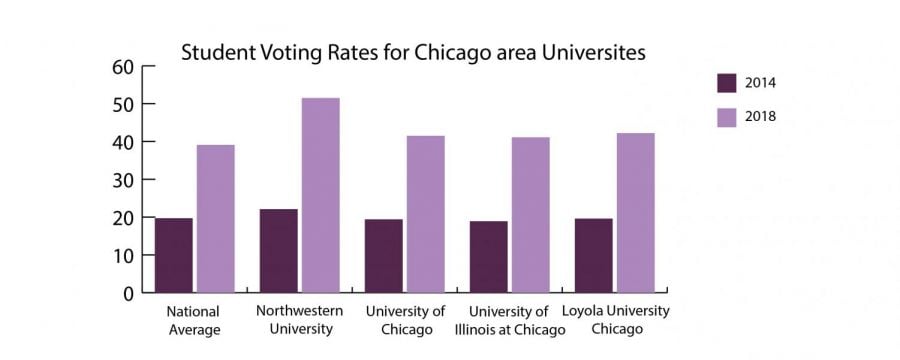NUVotes and local colleges’ initiatives encourage voting, civic engagement
January 10, 2020
The National Study of Learning, Voting and Engagement (NSLVE) at Tufts University reported in September 2019 that national college student voting increased from 19 percent in the 2014 midterm elections to 41 percent in the 2018 midterm elections. The college voter turnout for the 2018 midterms was closer to that of the recent presidential elections than the 2014 midterms.
This swell in voting rates is starkly different from 2012, the first year the study was conducted. Nancy Thomas, the director of the Institute for Democracy and Higher Education at Tufts University, which conducts the annual NSLVE report, said the initial results were a “wake-up call” to higher education officials.
Lauren Reynolds, a Bienen and SESP junior who works at Northwestern’s Center for Civic Engagement, said she has been involved in inputting data from NU Votes registration efforts and assisting in on-campus voter registration. NU Votes is a non-partisan effort of the Center for Civic Engagement that provides the Northwestern community with accessible voting information and informed voter participation.
Reynolds said she’s hoping to continue her fellowship in the next academic year, focusing on the 2020 presidential election. She said getting the word out about in-person voting in Evanston and providing resources for absentee voters has been NU Votes’s priority for the upcoming election.
“Right now we’re focusing on making sure people know how to vote in the primary election,” Reynolds said. “Once we hit (the general election), we have voting vans and we’ll take students to whatever polling center is most convenient for them.”
NU Votes started in 2011 as a way to increase voter registration rates at Northwestern. Since 2016, over 90 percent of Northwestern’s eligible freshmen were registered to vote. Robert Donahue, interim director of Northwestern’s Center for Civic Engagement, said he credited most of this increase to NU Votes.
“We’ve integrated (voter registration) into the onboarding process for incoming students during (orientation week),” Donahue said. “We saw right away that the participation levels really go through the roof.”
Donahue and other founding members of the center found that participation and registration efforts were achievable through the NU Votes Ambassador program. Sponsored by the Center for Civic Engagement, students can volunteer to present information and initiate conversations about elections in order to ensure Northwestern students are informed about their voting options.
Other universities in the area have recently launched programs to boost student voting rates. At Loyola University Chicago, civic engagement librarian Katherine Paterson coordinates library programs and services that support political involvement for students and the college community.
Paterson, who said her position was invented upon her permanent hiring in October 2018, said she he noticed an exponential increase in interest in voter registration on Loyola’s campus post-2016 election. Also a coordinator for the university’s voter registration initiative, Paterson said Chicago’s same-day registration is a key factor in encouraging student voting.
“During the midterms and the municipal elections, we did a lot of programming day-of to remind students where their polling places were and to remind students that are out-of-state that they could register same-day,” Paterson said.
Purvi Patel, the director of civic and campus engagement at the University of Chicago Institute of Politics, said students have the potential to be a powerful section of the electorate, but voter suppression and inaccessibility contribute to low student turnout on election day. At the university, for example, 66.5 percent of students are registered to vote, but only 41.5 percent of students actually voted, according to the school’s NSLVE report.
The University of Chicago Institute of Politics also runs an initiative called “UChiVotes,” a student-led non-partisan effort to ensure that the University of Chicago maximizes its voting engagement and turnout. In planning its programming for the rest of the academic year, the Institute of Politics aims to focus on the 2020 election, Patel said.
“We’re going to take students to the Iowa caucuses in February,” Patel said. “I’ve never seen a caucus in person, and I didn’t come from a caucus state. There’s a lot you can learn (about caucuses) from just literally observing.”
Email: [email protected]
Twitter: @isabellesarraf
Related Stories:
Northwestern has one of the highest voting rates among universities
Northwestern voting participation rate more than doubled in 2018 midterm elections
Northwestern registers record-setting percentage of freshmen to vote












